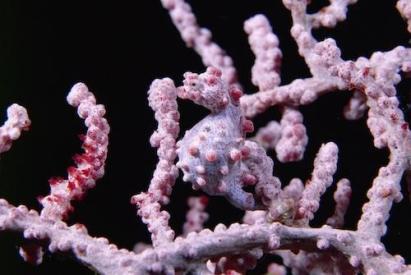
When it comes to living incognito among coral, the pygmy seahorse is the specialist. Coral reefs may be bright and spectacular but they are rough places to live, so animals often use camouflage to stay safe.
Focusing the attention on what we are looking for may seem easy. We can easily multitask and search for several things at the same time. We can read a text message, look for the spoon in the kitchen, while glancing over to see what the kids are up to at the table.
We rely on this skill to quickly search our surrounding and find what we are looking for. Experience helps us develop useful shortcuts so that we do not have to waste our time looking for a butterfly on the rocks instead our eyes are drawn to the flowers in the garden, which is a more likely spot to find a fluttering butterfly.
Knowing what we are searching for is helpful. It is easier to spot the seahorse in the picture above if you know that you are looking for a seahorse. The sea horse’s shape will “pop out” at you. Yet if we are searching for the same thing, we become used to not seeing it. And we become less watchful. At the airport, the luggage checkers may miss the gun in the bag since they are so used to seeing no guns in the luggage.
Several ideas to make sure that people do not miss target can be used such as working with a partner, and increasing how often a person finds something. Sadly, none of these strategies seems to enhance the discovery rate. Yet training with feedback on the accuracy of each scan may enhance the discovery rate.
A visual search can be carried out in different ways. Sometimes an active search is good when we want to get new knowledge while a passive search may be better when we are looking for something that is hidden. We can let our intuition guide us.
But focusing on the attention on finding something, a visual search, may be different from focusing the attention on other things. And focusing the attention on what we want is not always part of the solution. A sport person or musician needs to focus on thing that he or she does not want to happen. But it makes no sense to focus on what not to do or not to think of. For example, to say to yourself “I must not fall, I must not fall, ” will not prevent you from falling it might even lead to you falling. It is better to focus on things like I have to balance my arms (to not to fall).
More importantly, a sport person or musician need to focus on things that they can control. Many performers focus on things that make them anxious and distracted. By focusing on things you can control, you feel more confident and calm. This means that you may embrace the takes with confidence and present focus.
What does an expert focus on? A quarterbacks in football has to react and think very fast. Opponents are trying to prevent him from throwing a pass. If the back sees a blitz or that the line of teammates protecting him has been breached, he must make a quick decision. He can make a quick pass, take evasive action, or sacrifice himself to keep the ball. If he decides that he can survive he must decide where or when to throw the ball. Decisions regarding how potential receivers are moving and spread out must be taken into account. Lots of decision must be made while he is moving and avoiding other players. Noticing the important things is vital and making an instant decision.
Quarterbacks like radiologists and chess players use “selective attention”. A radiologist moves his or her eyes at a few locations before they are finding the necessary information. This means that if you put a gorilla in a non-vital area on the X-ray they will miss it. Expert thinks more efficiently and experience had thought them to eliminate and ignore certain aspects.

In the video below, Jeff Nelsen, former horn player for the Canadian Brass, discusses how important it is that performers focus about the WHAT and HOW in their performing! But they need to refocus before their performance and focus on the WHYs.
- Why do I perform?
- What is it I want to share?
- Why did I choose to perform in the first place?
Focusing the attention is a form of athleticism. Like swimming, it requires training and practice. Yet the why you train and focus your attention influence how much you get out of it. What aspects are important to focus on when you are solving a problem, or looking for new ideas? Do you need to refocus your attention? When do you need to refocus? And how do you know that you need to shift your attention?
Photo Steve Childs/Flickr
